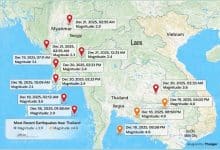Vietnam prioritises economic growth despite global challenges

Vietnam will focus on bolstering economic growth despite ongoing challenges from weak global demand, announced Deputy Prime Minister Le Minh Khai.
Addressing the National Assembly during its summer session, Khai noted that while gross domestic product (GDP) growth has improved, significant hurdles remain. Industrial activity is recovering, albeit at a slow pace.
Vietnam, now a manufacturing hub benefiting from shifting supply chains due to US-China tensions, is experiencing the effects of elevated global interest rates, which are reducing demand for goods. Despite being one of Asia’s fastest-growing economies, its growth rate is still below the pre-pandemic level of 7%.
Khai emphasised Vietnam’s commitment to achieving the highest possible economic output but acknowledged the risk of high inflation this year.
“While the Israel-Hamas war has had limited global economic impact so far, any escalation involving Iran could disrupt trade through the Strait of Hormuz, potentially leading to a US$1 trillion drop in global GDP.”
The government aims for economic growth of 6% to 6.5% this year, surpassing the International Monetary Fund’s projection of 5.8%. The official inflation target is set between 4% and 4.5%.
Khai stated that the government will persist with policies such as lowering lending interest rates, postponing debt payments, and reducing taxes to support businesses.
Vietnam’s economy experienced a slowdown in the first quarter due to an uneven recovery in exports and manufacturing activity, Khai mentioned. He added that political stability is expected to boost economic sentiment moving forward.
The Communist Party recently nominated new leaders, including a new president and the chairman of the National Assembly, over the weekend. These appointments are seen as a signal that the frequent changes in top political positions may come to an end, potentially reassuring investors, reported Bangkok Post.
In related news, Thailand’s economic growth forecast was revised downward. The Joint Standing Committee on Commerce, Industry, and Banking (JSCCIB) revised Thailand’s economic growth forecast downward from a range of 2.8 to 3.3% to 2.2 to 2.7% for the year. The revised outlook is due to a slowdown in exports, which is negatively affecting the manufacturing sector.
Latest Thailand News
Follow The Thaiger on Google News:


























